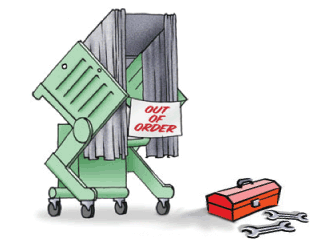
Related Articles: |
Suddenly, in a New York minute, both houses of the New York State legislature last week passed a sweeping array of bills aimed at improving the election system. There are two separate packages, though, and they offer very different ways of reforming New York’s broken electoral process.
But at least they offer something. This flurry of legislation comes after two years of delays.
The legislature is acting because, as I wrote a year ago, New York, like every other state, is facing a deadline imposed by the federal Help America Vote Act, or HAVA. Thus far, the process for implementing the law has been tenuous, partisan, political, and vague.
HELPING, AND HINDERING, BEGINS IN WASHINGTON
The Help America Vote Act was enacted after the messy 2000 presidential election and is designed to reform the election process by- upgrading voting machines,
- implementing statewide voter databases,
- requiring identification checks for first-time voters by mail,
- allowing full access to voters with disabilities and voters whose primary language is not English the opportunity to cast an independent ballot
- and creating an Election Assistance Commission.
To begin with, the statute is vaguely written and open to much interpretation by the states. But the problems in implementing it also start in Washington, where there have been numerous delays. Though the bill was signed into law in 2002, for example, no members were named to the Election Assistance Commission until a few months ago.
The delays in Washington have aggravated delays in New York State, which is required to come up with a plan that is approved by the federal commission. Because the commission was late in forming, New York has applied for a waiver until 2006 to be in compliance with the Help America Vote Act – and this includes purchasing new voting machines.
A NEW YORK STATE OF MINDLESSNESS
It would be wrong to blame Washington alone. New York is nowhere near having the clear, accountable, and efficient system the federal law gives states the opportunity to create. The Coalition on Voter Implementation, made up of New York City's leading civic organizations, has lambasted the New York State Board of Elections Task Force on HAVA Implementation for a poorly designed process and for producing an implementation plan that is extremely vague. The Board of Elections wrote the final "task force report" without any input from the members of the task force, some of whom were so displeased with the results that they issued a minority report last fall that included much more detail over how to implement the federal statute and actually reform the voting system.
Assembly vs. Senate
The New York State Legislature has been responsive to the opportunity to reform the election system. Last year, the Assembly passed a great package of legislation that aimed to add details to the task force plan. The
legislation would:
- expand the range of identification voters could use at the polls,
- push for voter-verified audit trails (the cause for much debate nationwide),
- urge a single statewide machine,
- give custody of the machines to the counties,
- and improve poll worker training.
All these bills died in the Senate last session.
But on February 23rd, there was much action in Albany on election reform. Assembly Speaker Silver held a press conference to re-introduce the Help America Vote Act package of legislation, which passed the Assembly that day. Senate Election Law Committee Chair Thomas Morahan countered by introducing six HAVA-related bills of his own, which passed the Senate that same afternoon.
The Assembly bills provide an urgently needed first step towards a uniform, cleanly administered voting system for every New Yorker. Provisions in the Senate bills allow for a better complaint procedure for voters.
Only if the two work together will New York become more accountable for its election system.
But even this would not be enough to provide a better and cleaner election system. That would require the passage of a few other bills that have been introduced in the Senate and Assembly:
Assemblymember Stringer is leading the fight for Election Day Voter Registration, a proven solution to low voter turnout and voter apathy among young voters. It has proven to increase voter turnout above the national average, made it easier for voters who move to register more easily, has led to fewer reported problems with fraud, administrative complexity, or excessive cost in the six states that permit same-day registration, and reduced the number of provisional ballots and accompanying cumbersome administrative demands on registrars. Election Day registration would allow New Yorkers who get interested in an election two weeks before Election Day the opportunity to vote.
Assemblymember Peter Rivera has introduced a bill that will eliminate the full-face ballot requirement - a procedure in which New Yorkers vote off of a huge page that includes the names of every person running for office in that election. The problems with full-face ballot are many: voters with disabilities have problems reaching the ballot, voters with cognitive disabilities have problems when confronted with the information on the ballot, and districts with more than one language on the ballot as prescribed by the Voting Rights Act are prone to a ballot in tiny print that makes it hard to read. The full-face ballot is also much more expensive than a regular ballot, and the full-face ballot limits New York to a few voting machine vendors - which also excludes machine vendors the disabilities community endorses. The reasons for changing the full-face ballot are many and necessary.
Jillian Matundan is the election reform associate of Citizens Union Foundation, the publisher of Gotham Gazette.




